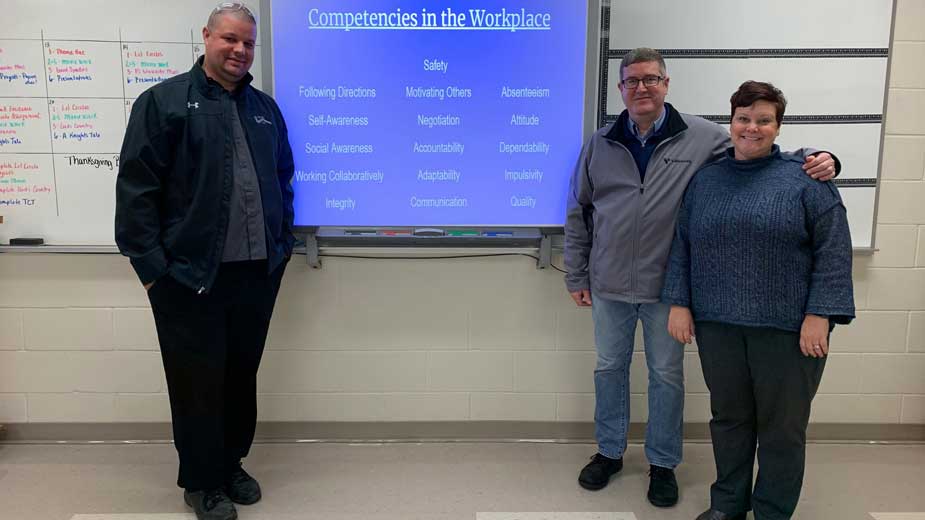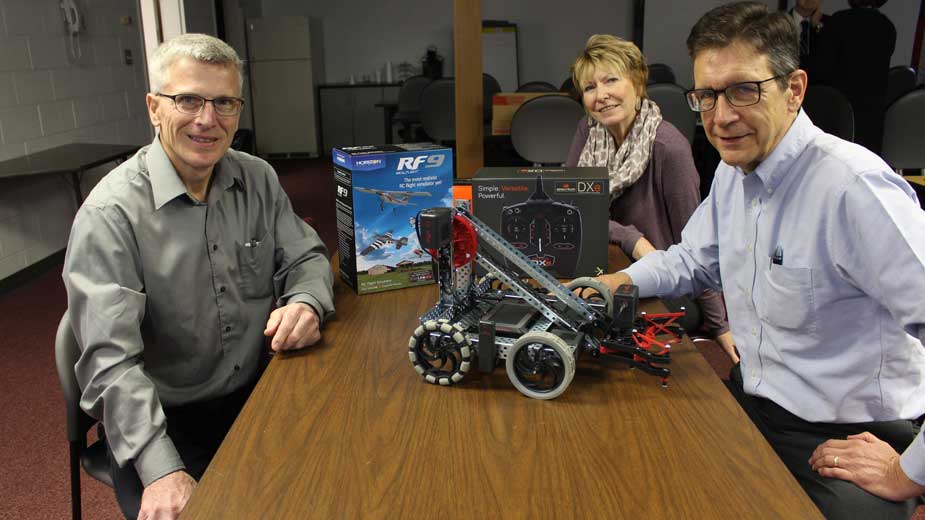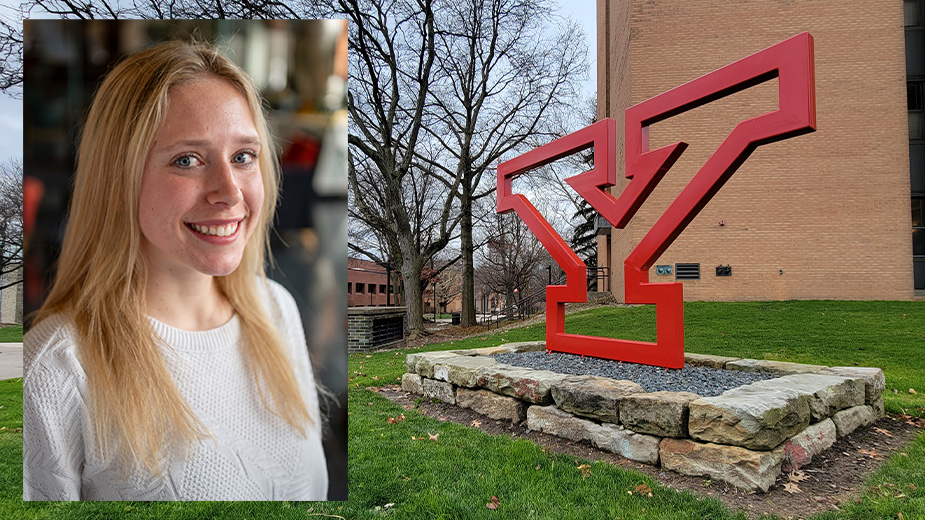County ESCs Connect Schools with Business
YOUNGSTOWN, Ohio — Traditionally, educational service centers provide school districts with professional-development or administrative services. But now ESCs have another role to fill as conduits between school districts and area employers in need of skilled workers.
In 2017, Ohio required all ESCs to have a business-advisory council to facilitate cooperation among schools, businesses and communities. The goal is to increase awareness of the local labor market among school districts, promote work-based experiences within companies and better prepare students to work available jobs.
Regionally, ESCs and their business-advisory councils have hosted large-scale job fairs and expos, organized student visits to area employers and taken steps to integrate modern job training into school curriculums.
The Columbiana County Educational Service Center’s business advisory council, or BAC, is expanding its Project Inspire program with drone construction using 3D printing.
Trumbull County ESC is also gearing its programming to include emerging STEM technologies, as well as encouraging entrepreneurship.
Through its Educator in the Workplace program, the Mahoning County ESC brings “real-life experience” into the classroom to answer the familiar question among students: “Why do I need to know this?” says Sandy Furano, director of the Mahoning Valley Regional Council of Governments and the county BAC.
This year, 10 Mahoning County teachers shadowed area professionals for 40 hours through the program, says Robert Eggleston, lead career counselor with the MCESC. Teachers experience everything that the workers do and how school subjects are applicable to those jobs, he says.
From there, the teacher and the professional develop a project-based lesson plan, where the professional instructs with the teacher in the school.
“So, now instead of just having a class on Pythagorean theorem, or something along those lines, they have a plumber who uses it every single day coming in to teach geometry in that teacher’s class,” Eggleston says.
“They have totally reformed their lesson plan for that topic based on that business,” Furano adds. “The BAC has really made that gap smaller between educators and the business world.”
One of the workers shadowed was Chris Allen, North American talent-acquisition manager at Vallourec USA Corp. Allen worked with two teachers this year, including Emily Randolph, a language arts teacher from East Palestine High School. Randolph also teaches career readiness, which is central to Allen’s message, he says.
Allen took Randolph on a plant tour and showed her “almost every aspect of the business,” he says, including operations, human resources, purchasing, finance and supply chain. They also discussed the top competencies Vallourec uses to assess and evaluate job applicants so they could develop a lesson plan “that was based on getting students to the point where they’re employable,” he says.
Such competencies encompass safety, self-awareness, impulsiveness, attitude, communication and collaboration. Graduating students competent in these soft skills are important to “fill the top of the funnel” with potential job applicants so area employers aren’t competing for workers, Allen says.

To ensure students geared for noncollege professions can graduate, Mahoning County schools are effecting classes offering certain work credentials for those careers, including Microsoft Office, OSHA 10 and CPR, Eggleston says. For students who entered ninth grade between July 1, 2017, and June 30, 2019, earning workforce credentials is an alternative pathway to graduation in lieu of college and career readiness tests, such as the ACT or SAT, he says.
“They’re really starting to embrace the whole idea of career education,” Eggleston says. “And that’s starting to happen everywhere.”
Soft skills are a key concern for area employers, says Howard Rohleder, chairman of the Columbiana County BAC. While the new drone program offered through the county’s ESC Project Inspire teaches robotics skills that are transferable to real-world applications, students also strengthen soft skills such as collaboration and problem-solving, he says.
Project Inspire was launched in 2016 in partnership with Kent State University Columbiana County with a $1 million grant from the Ohio Department of Education, and introduced STEM curricula to seven county school districts. Now in its third year, Project Inspire serves 10 districts and competes in events organized by Vex Robotics.
For the drone program, teams use Fusion 360, computer-aided drafting software, to design the body of the drone, build the parts using 3D printers and assemble the drones themselves, says Jeff Gill, Project Inspire instructor. Drones are designed to complete specific objectives such as lifting and carrying an object, improving flight time or better maneuverability. The design and programming phases are complex, which is challenging for the students, he says.
“A lot of students have trouble,” Gill says. “But when they see that they can overcome some of that and have success, that problem-solving kicks in a bit more, raising their ability.”
“That’s exactly a soft skill that employers are looking for – that you’re not frustrated the first time you run up against an obstacle,” Rohleder adds. “You’ve matured to the point that you realize that you can overcome this obstacle, but it takes some work, some thinking and some problem-solving and working as a team to do it.”
Individual programs have blossomed into larger events, including Mahoning County ESC bus trips to area employers – it looks to include trips to Trumbull County employers in 2020 – and the inaugural Mahoning Valley Skilled Trades Expo, which drew more than 4,500 students to the Canfield Fairgrounds in September, MCESC’s Eggleston says. To get that many students out of class to attend an event, “you had to have cooperation from the schools,” he adds.

In Trumbull County, the Junior Achievement College, Career and Trades Conference in October was held in partnership with Junior Achievement of Mahoning Valley and the Trumbull County ESC at the former Sears space at Eastwood Mall in Niles. It drew more than 3,000 students.
With 20 school districts, Trumbull is “a large county” with some schools more than 30 miles from Eastwood Mall, says Denise Holloway, supervisor of the Trumbull Student Assistance Consortium at the Trumbull County ESC. So it was important to hold the event at a location that could accommodate everyone.
“Sometimes kids out in those rural areas don’t necessarily make it in to attend these type of events,” Holloway says. “If we can partner with our schools and we can have that collaboration with one event where we can bring as many students [as possible] in – that’s our goal.”
The Trumbull County ESC partners with the Workforce Development Board of Trumbull County for its business advisory council, says its superintendent, Michael Hanshaw. The partnership has some 40 business, government and educational entities that “we can tap into as an educational entity to be able to provide some opportunities for our students,” he says.
Through its partnership with Trumbull County ESC, JA effects curriculum from elementary to high school to fulfill career-exploration mandates set by the Ohio Department of Education, says its president, Michele Merkel.
Part of that curriculum includes developing an entrepreneurial mindset that, while not mandated, is increasingly popular, Merkel says. Entrepreneurship projects give students hands-on experience in dealing with vendors, contracts, tracking income and expenses, managing a checking account and payroll.
“That gives them the skills they need to be successful in their future careers, wherever they go,” Merkel says. “We see students go from being that shy student who didn’t say anything to stepping in to run a business.”
A project with Pizza Joe’s had students develop an original pizza concept. Students learned entrepreneurial skills, such as marketing and financial literacy, and one winning group got to see its pizza marketed and sold.
The Trumbull ESC and JA look to launch a STEM entrepreneurship program and will be hosting a STEM business fair Dec. 12, says Joe Bell, director of corporate communications for the Cafaro Co. They’re also planning a communitywide business fair for March 14 that will include entrepreneur workshops.
“This is aimed at encouraging young entrepreneurs. Kids will be coming in to present their ideas and projects,” Bell says. Both events will be held at the Eastwood Mall. The Cafaro Foundation awarded the Trumbull ESC a $10,000 grant to help fund such events, he says.
Columbiana County works to get children engaged in STEM as young as pre-K. The CCESC’s Kids STEAM University (STEM plus arts) just completed its second year and doubled its enrollment, says ESC Superintendent Anna Marie Vaughn. The one-day event hosted 200 pre-K to fifth-grade students from five districts this year, engaging them with hands-on projects to help them explore their passions, she says.
Helping students find their passions and build a sense of purpose at a young age sets a better foundation for learning, Vaughn says. It also fosters a student’s ability to think creatively and to collaborate.
“Having a passion for something makes the education more relevant to the students,” Vaughn says.
While current programs and events help connect students to employers, the next challenge is reaching parents – and teachers – who may still believe manufacturing and trades work is dirty and difficult, observes the Columbiana County BAC’s Rohleder.
BAC partner companies host open houses for workers’ families and the public to show that jobs aren’t as back-breaking as they once were because robots do much of the heavy lifting, he says. It also introduces them to nonassembly jobs in manufacturing, such as engineers, office staff, sales and maintenance.
“It’s having a full understanding of what manufacturing is today and the wide variety of options there are in manufacturing,” Rohleder says. “Manufacturers are showing a willingness to talk to the younger students and show them that there are pathways to a good middle-class income without incurring debt and without going to college.”
Copyright 2024 The Business Journal, Youngstown, Ohio.



